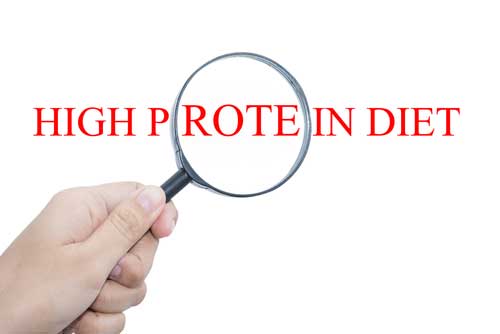Protein is a key macronutrient, especially if you’re trying to build lean body mass. Without enough protein in your diet, it’s unlikely you’ll experience the expected gains in lean body mass even if you train hard. Dietary protein is also important when you’re trying to lose weight. Research shows diets higher in protein offer a number of advantages when you’re trying to slim down.
One way protein offers benefits is by increasing satiety. When you eat a diet higher in protein, it boosts the release of hormones like CCK and peptide PYY that signal your brain that you’re full. As research shows, your body has to work harder to digest and break down protein due to its complex structure. So, a diet higher in protein leads to slightly greater calorie expenditure after a meal than a comparable amount of carbohydrates and fat. Now, a recent study looking at this issue sheds new insight into the metabolic effects of high-protein diets and why calories count when it comes to losing weight.
The Effects of High-Protein Diets on Metabolic Rate, Body Composition and Weight Gain
In this study, researchers assigned 16 healthy people to a diet consisting of varying amounts of protein. Some participants ate a low-protein diet (5% of total calories). A second group ate a moderate-protein diet (15% of total calories) while a third ate a high-protein diet (25% of total calories). Researchers wanted to see whether the quantity of protein in their diet would affect how much weight they gained when they consumed excess calories. They also wanted to know whether a higher protein diet would boost their metabolic rate. The participants followed the prescribed diets for 2 months and were closely monitored in a metabolic ward where researchers measured their metabolic rate for up to 4 hours after a meal.
The results? Interestingly, the participants in each group gained similar amounts of weight, regardless of the protein content of their diet, but there was a significant difference in the composition of the weight they gained. The group that ate a high-protein diet stored almost half of the excess calories they ate as lean body mass, while the participants that ate a low-protein diet stored 95% of the weight they gained as body fat. In this study, consuming more protein didn’t offer weight loss advantages but it did impact the composition of the weight gain. If you have to choose between gaining body fat or lean body mass, which would you select? According to this study, if you’re going to overeat, make sure the foods you eat are high in protein.
Calories Count but They’re Not All the Same
Some other interesting observations came from this study. Based on measurements of the participants’ metabolic rate using indirect calorimetry, the metabolic boost from eating a high-protein diet often isn’t sustained once you switch back to a diet containing moderate amounts of protein. It also showed eating a high-protein diet doesn’t protect against weight gain when you eat too many calories, although it impacts the composition of the weight gain. Calories still count but not all calories are the same. If you consume too many calories in the form of protein, you’ll likely store a portion of those calories as lean tissue as opposed to fat.
Strike a Healthy Balance with Your Diet
There’s no need to go overboard with protein when you’re trying to lose weight but it is a good idea to eat a lean source of protein at every meal. Spreading your protein intake out over the course of the day rather than eating it at one meal helps with satiety and appetite control. It also ensures your muscles have access to amino acids for recovery from exercise and to stimulate muscle growth. If you resistance train or do high-intensity exercise, you need more protein than a sedentary person. Recommendations are that sedentary people get 0.8 grams of protein per kilogram of body weight, but you may need as much as twice that amount if you do vigorous aerobic or resistance workouts.
Recent research also suggests that adults over the age of 65 need more dietary protein due to issues with absorption and to help prevent muscle breakdown related to aging. Loss of lean body mass is a major cause of falls and loss of functional ability as people get older. Protein helps maintain healthy immune function, which is important at all ages and stages of life, especially when flu season rolls around.
Strike a healthy balance by eating protein in combination with fiber-rich fruits vegetables and moderate amounts of healthy fats. Rather than go heavy on the red meat, choose more fish and plant-based protein sources like tempeh, lentils, beans, and quinoa. Avoid processed meats. Research has linked processed meats with a greater risk for certain forms of cancer and to a higher risk for mortality. Make smart and varied protein choices.
The Bottom Line?
Don’t skimp on protein when you’re trying to lose weight. Just as importantly, skip the sugar, white flour and processed carbs that have little or no nutritional value and negatively impact your blood sugar.
References:
Science Daily. “Human Body Cannot Be Trained to Maintain a Higher Metabolism, Study Suggests” November 2014.
Today’s Dietitian. Vol. 12 No. 2 P. 34. February 2010.
Science Daily. “Eating Protein Boosts Hormone That Staves Off Hunger” September 2006.
J Am Med Dir Assoc. 2013 Aug;14(8):542-59. doi: 10.1016/j.jamda.2013.05.021. Epub 2013 Jul 16.
Medscape Family Medicine. “High Intake of Processed Meat Linked to Cancer Deaths” May 2013.
Related Articles By Cathe:
4 Reasons Boosting the Protein Content of Your Diet Can Help You Lose Weight


